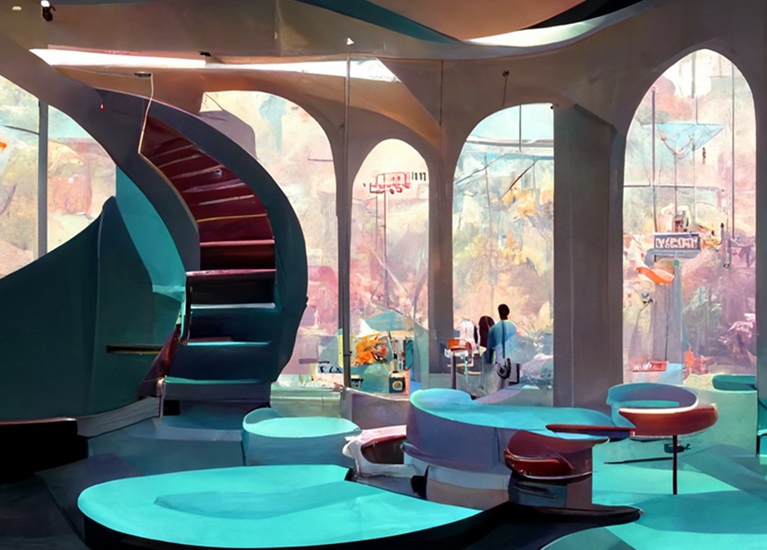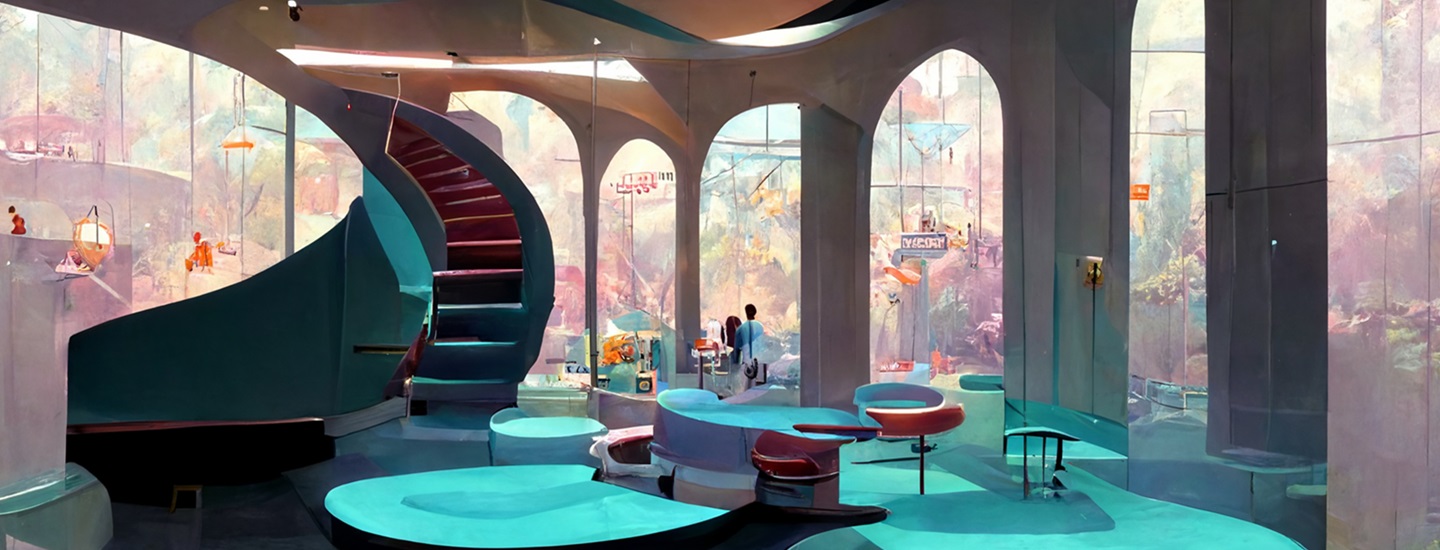Article 31 Oct 2023 5 min read
The metaverse: A game changer for the hospitality industry



Do you know that the metaverse is one of the top 10 strategic technology trends in 2023 and beyond? Today, metaverse is one of those technology trends that directly impact strategy and engagement models across industries. The metaverse not only brings in immense scope for empowering businesses with limitless possibilities, it ushers in a new era of immersive and unique experiences.
So, what is the metaverse?
The metaverse is a convergence of physical and digital realms, blurring the boundaries between the real world and virtual environments. Within the metaverse, individuals can explore virtual venues, interact with other like-minded people, and participate in a variety of activities, all facilitated by an amalgamation of cutting-edge and futuristic digital technologies.-Oct-27-2023-07-14-39-6700-AM.png?width=750&height=370&name=MicrosoftTeams-image%20(35)-Oct-27-2023-07-14-39-6700-AM.png)
These include artificial intelligence (AI), augmented reality (AR), head-mounted displays (HMDs), an AR cloud, the Internet of Things (IoT), and 5G.
Navigating the current developments in the metaverse in travel and tourism
The metaverse has emerged as a transformative force, reshaping the landscape of industries across the board. From gaming, media and entertainment to education, retail, aviation, banking, and beyond, the metaverse is revolutionizing how businesses operate and engage with their audiences. With its immersive, interactive, and interconnected virtual world, the metaverse is enabling unprecedented levels of collaboration, communication, and innovation.
The metaverse has also made pathways in the travel and hospitality space. Some of them are listed below.
- Emirates to launch experience in the metaverse. The airline has plans to enable people to enjoy its in-flight hospitality virtually.
- Qatar Airways has launched QVerse, a VR experience for passengers to navigate the premium check-in area at Hamad International Airport (HIA).
- To train its staff, Hilton has used the virtual reality technology by Oculus for business, that would help employees build empathy with customers and as well as enhance their hospitality skills.
Can the hospitality industry tap into the opportunities from different metaverse types?
Embracing the potential of the metaverse is crucial for optimizing digital business and innovation in product and service development. It is more effective to focus on building a diverse range of metaverse offerings by combining innovative elements.
Let's explore diverse categories in the metaverse to unlock opportunities.
- The gaming metaverse: Gaming and interactive entertainment.
- The commerce metaverse: Online shopping and retail.
- The work metaverse: Work and collaboration (MRO & Training)
- The social metaverse: Centered around social interaction and communication.
-3.png?width=750&height=428&name=MicrosoftTeams-image%20(36)-3.png)
1. The gaming metaverse
The hospitality industry can enhance guest experiences through immersive gaming and interactive entertainment. The gaming metaverse provides a platform for hosting virtual events and conferences within a virtual environment. Hotels can organize virtual industry conferences, business meetings, or networking events where participants can create avatars and perform tasks or challenges and engage with each other in a dynamic virtual setting. The events can be monetized through virtual ticket sales, sponsorships, and virtual merchandise. It enables the hospitality industry to adapt to the increasing demand and expand its event-hosting capabilities.
Hotels can introduce gamification elements into their loyalty programs within the gaming metaverse. By incorporating game mechanics, challenges, and rewards, guests can earn virtual currency or exclusive in-game items as they engage with the hotel's services. This gamified approach encourages repeat bookings and guest loyalty, and creates a more engaging guest experience, in addition to spreading brand awareness of the hotel to the wider group.
By introducing game-like elements such as badges, leaderboards, and levels hotels can incentivize participation and encourage a creator economy. Also, gamification can create additional revenue streams through features like virtual goods, in-game purchases, or subscription models. Not only this, but gamified systems also generate valuable data and analytics on user behaviour, preferences, and performance which can be leveraged to gain insights into their audience's interests, optimize strategies, and make data-driven decisions for growth.
2. The commerce metaverse
The commerce metaverse provides a platform for hotels to sell merchandise and branded products online. This can include items such as hotel-branded clothing, accessories, toiletries, or even signature perfumes. By offering these products through the metaverse, hotels can extend their brand reach, and create additional profits.
Also, hotels can offer exclusive packages and discounted rates for bookings made through the commerce metaverse. Hotels can incentivize guests to book directly through the metaverse through which hotels can reduce dependency on third-party booking platforms and establish a direct relationship with guests which allows maximizing profits and maintaining control over pricing and inventory.
Hotels can offer virtual gift cards or vouchers for purchase through the commerce metaverse. These can be redeemed for future stays, dining experiences, or other hotel services. By providing virtual gift cards, hotels can boost the cash flow cycle, encourage repeat bookings, and attract new guests who receive gift cards as presents or incentives.
3. The work metaverse
Hotels can utilize the work metaverse to offer online training programs and workshops for their staff or external professionals. Virtual training sessions can cover various topics such as hospitality skills, customer service, leadership, or industry-specific knowledge. This allows hotels to provide flexible and scalable training solutions, improve staff competency, and enhance service quality.
Hotels can also organize virtual job fairs within the work metaverse to connect with potential candidates. This allows them to showcase career opportunities, engage with job seekers, and conduct virtual interviews. Virtual job fairs save time and resources compared to traditional in-person events, making recruitment more efficient and enabling access to a wider talent pool.
Immersive technology can simulate various role-playing scenarios such as customer interactions, allowing hotel staff to practice effective communication and problem-solving skills in realistic scenarios. Simulation to replicate fire emergency situations, allowing staff to practice evacuation procedures, use fire extinguishers, and identify safe exits can be advantageous in real-life situations.
4. The social metaverse
Through the social metaverse, hotels can offer virtual concierge services where guests can interact with digital avatars representing staff members. Guests can make inquiries, seek recommendations, and receive personalized assistance within the virtual environment. Virtual concierge services enhance guest satisfaction, provide 24/7 support, and create a seamless and interactive guest experience. Guests can make reservations for dining, spa treatments, events, or other hotel services through the virtual concierge platform.
Hotels can facilitate community-building within the social metaverse by creating dedicated spaces for guests to share experiences, stories, and recommendations. Guests can post content, such as reviews, photos, and videos, which can be shared within the virtual community to strengthen guest trust and promote the hotel to a wider audience.
Cooking classes organized by hotel chefs in the metaverse can be designed to facilitate social interaction and networking. Participants can join pre- or post-class social gatherings to chat, share their culinary creations, exchange recipes, and bond over their love for cooking. These social interactions among participants, create a vibrant community within the metaverse.
Conclusion
In today's era, technology is evolving rapidly and dynamically. It is crucial for hospitality businesses to embrace and adapt to these evolving technologies to foster growth and seize new opportunities. Undoubtedly, technology continues to provide unwavering support to organizational growth and agility with evolving business value chains. By expanding into virtual venues (such as the metaverse environment) and ecosystems integrated with digital currencies, technology can effectively drive continuous expansion and progress. Moreover, businesses can leverage these technologies to reach customers in innovative ways, strengthening existing revenue streams and opening doors to new opportunities, thus gaining a competitive edge.
We would love to hear your feedback on this article! For thoughts on this topic, or a quick chat on how we can work together to achieve your business targets through technology, mail our hospitality experts at hospitality@nagarro.com.



